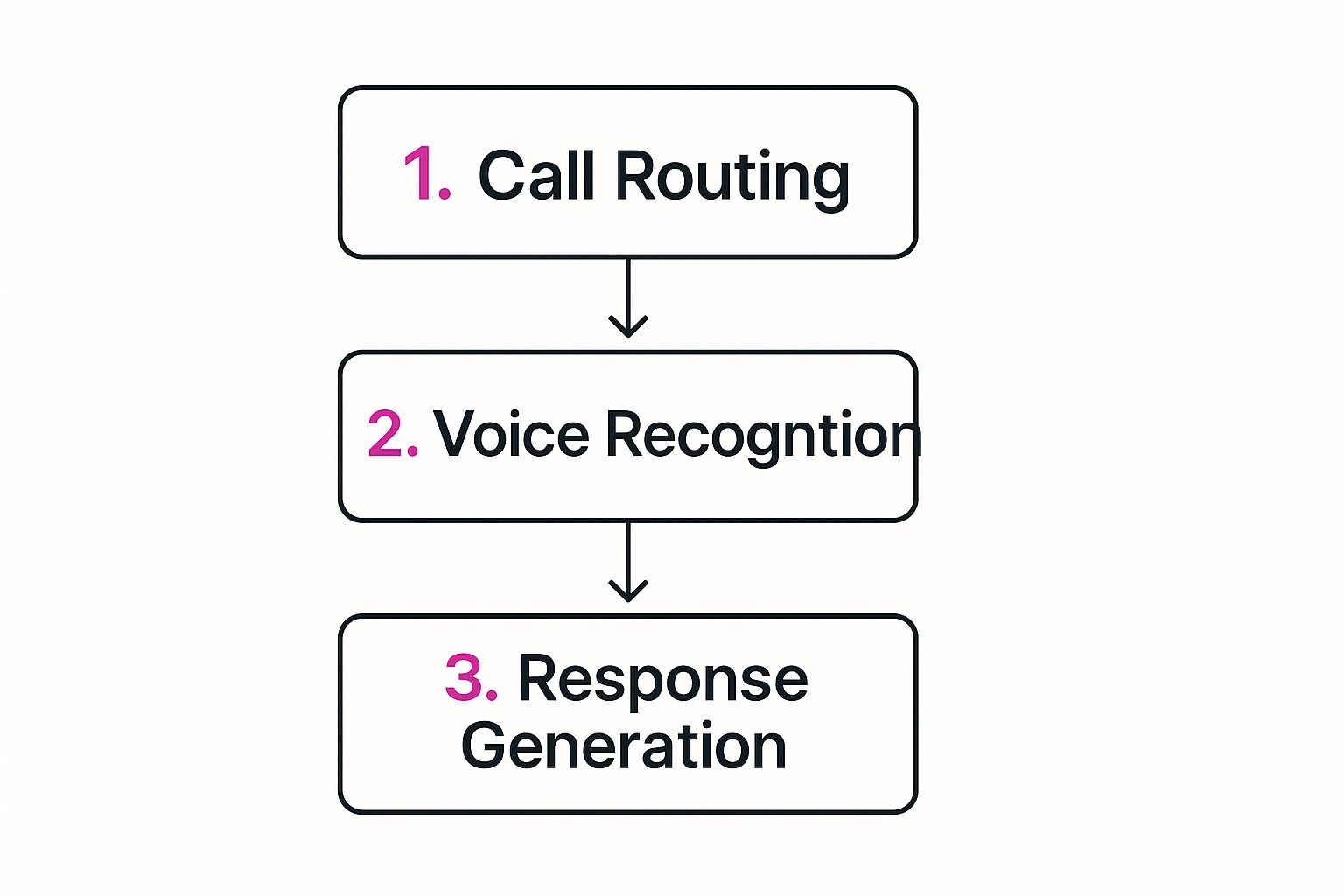Your Guide to an AI Phone Call Assistant
So, what exactly is an AI phone call assistant? In simple terms, it's a smart piece of of software that uses artificial intelligence to handle your phone calls. Think of it as the ultimate digital receptionist—one that’s always on, always professional, and never misses a beat. It answers calls, deals with questions, and makes sure no customer ever gets sent to a ringing, unanswered void.
This isn't your grandma's answering machine. This is technology that tackles some of the oldest headaches in business: missed calls and inconsistent customer service.
How AI Is Transforming Business Phone Calls

We’ve all been there—stuck in an endless game of phone tag or listening to terrible hold music. For decades, these were just the accepted, frustrating realities of doing business over the phone. A single missed call could mean a lost sale. A rushed or grumpy receptionist could sour a hard-won reputation.
Old-school phone systems just couldn't measure up to what customers expect today: instant, helpful, and reliable support.
This is where a modern AI phone call assistant completely flips the script. It's not just about picking up the phone; it's about actually understanding the conversation.
The Problem AI Assistants Solve
At its heart, an AI assistant solves the very human problems of limited availability and inconsistency. Your best receptionist can only take one call at a time. They also need breaks, sick days, and weekends off.
An AI assistant, on the other hand, brings a few superpowers to the table:
- 24/7 Availability: It’s always on, ready to answer every single call, whether it’s noon on a Tuesday or 3 AM on a Sunday. You never miss a lead.
- Perfect Professionalism: Every single caller gets the same perfectly on-brand experience. The tone is always right, the script is always followed, and your business always sounds its best.
- Instantaneous Understanding: This is the magic. Using advanced voice recognition and natural language processing, the AI figures out why someone is calling in real-time.
That leap from passively answering a call to actively solving a problem is what makes this technology so powerful.
An AI assistant isn’t just a fancy voicemail. It’s a strategic tool built to capture opportunities, boost efficiency, and make a great first impression from the moment the phone rings.
The move to AI is backed by some serious numbers. Studies show that AI-powered phone systems can slash operational costs by 30-60% just by automating the simple, repetitive stuff. It's no wonder that nearly 69% of consumers now say they prefer using AI self-service tools because they're faster and more convenient. The customer expectation has officially shifted.
You can read more about the economic impact of AI in business communications to see just how big this trend has become.
Understanding How an AI Phone Assistant Works
[Content type 'embed' not supported]
To really get what an AI phone call assistant does, we have to pop the hood and look at the tech making it all happen. It’s a pretty slick process, but you can break it down into a few simple steps that all fire off in the blink of an eye.
Think of it as the world’s most efficient receptionist—one who can listen, understand, decide, and reply almost instantly. The magic starts the very second a call connects.
From Spoken Words to Digital Understanding
First things first, the AI needs to hear what the caller is saying. This is where a technology called Speech-to-Text (STT) comes into play. The STT engine is like a lightning-fast court reporter, turning the sound waves of the caller’s voice into written words. It’s basically taking perfect, real-time notes.
Once the words are in text form, the AI’s “brain” takes over. This is powered by Natural Language Processing (NLP), and it's what separates a smart assistant from a dumb menu. NLP allows the system to move beyond just recognizing words to actually understanding meaning, context, and intent. It can tell the difference between "What time do you close?" and "I need to change my appointment."
This is the key. A basic automated system listens for keywords. A true AI phone assistant actually understands the purpose of the call.
This infographic breaks down how it all flows together, from the first ring to the final answer.

As you can see, the tech moves seamlessly from hearing the caller to figuring out what they need and crafting a helpful response in just seconds.
Deciding and Responding with Precision
After it understands the caller's request, the AI figures out the best way forward. It might give a direct answer, book an appointment into a calendar, or—if the question is too complex—route the call to the right human.
Finally, the assistant has to talk back. It uses Text-to-Speech (TTS) technology to convert its decision back into natural-sounding spoken words. Modern TTS is incredibly good, producing clear, human-like voices that make the whole conversation feel smooth and professional.
This kind of technology is catching on fast, and the market is exploding. The AI voice assistant market, valued at 33.47 billion in 2024, is expected to shoot past ****104 billion by 2032. That massive growth shows just how much businesses are starting to rely on AI to handle their communications. You can read more about these market trends and what's fueling the boom.
Key Features of a Modern AI Call Assistant

So, what really separates a modern AI phone call assistant from one of those clunky, old-school automated menus? The difference is huge. It’s a whole suite of powerful features that don't just answer calls, but actively solve problems, save you time, and create a genuinely professional experience for your customers.
Think of these systems less like a recorded message and more like a dynamic tool. They're designed to understand nuance, manage schedules, and even pull valuable insights for you long after the call has ended.
Let's break down the essential capabilities that deliver real, tangible value to a business.
Intelligent and Conversational Call Routing
Forget the frustrating "press one for sales, press two for support" loop that everyone hates. Modern assistants use conversational intelligence to figure out where a caller needs to go.
A customer can just say, "I have a question about my last bill," and the AI instantly understands their intent. No button-mashing required—it routes them straight to the billing department. It’s the difference between navigating a confusing maze and having a helpful guide lead you right to your destination.
Around the Clock Availability
One of the biggest wins here is the ability to operate 24/7/365. An AI assistant doesn't take holidays, sick days, or coffee breaks. This constant availability means you never miss an opportunity, whether a potential client calls after hours or a customer needs a hand on a weekend.
For a small business, this is a game-changer. It levels the playing field, letting you offer the kind of round-the-clock service that used to be possible only for massive corporations with huge call centers.
An effective AI assistant ensures that your business's front door is always open, ready to greet every caller with perfect professionalism, no matter the time or day.
Automated Scheduling and Calendar Sync
Manually scheduling appointments is a massive time-suck. An AI phone call assistant can handle this entire process for you, automatically.
When a client calls to book a consultation, the AI can access your calendar in real-time, offer up the available time slots, and confirm the appointment—all without any human input. Once booked, the event is instantly added to your synced calendar, wiping out the risk of double bookings and all that administrative busywork. This turns your phone system into an active, revenue-generating machine.
Of course, sometimes the AI will still need to take a message, and it’s crucial to sound polished. You can check out some great examples of professional voicemail greetings to keep your brand voice consistent.
Comprehensive Call Transcription and Analysis
Every single conversation with a customer contains valuable data. A key feature of advanced AI assistants is their ability to transcribe every call as it happens. This creates a searchable text record of the entire conversation, which is invaluable for quality control, team training, and quickly referencing customer details.
But it goes a step further. The AI can also analyze these transcripts for keywords, customer sentiment, and common themes, giving you powerful insights into why your customers are calling in the first place. This turns your call logs from a simple record into a source of actionable business intelligence.
To really see how far we've come, let’s compare the different phone system capabilities side-by-side.
Phone System Capabilities Compared
The evolution from a basic business line to a smart AI assistant is pretty dramatic. The table below lays out the key differences, showing just how much more a modern system can do for you.
| Feature | Traditional Phone System | Basic IVR System | AI Phone Call Assistant | | --- | --- | --- | --- | | Availability | Business Hours Only | 24/7 (Limited Actions) | True 24/7/365 | | Routing | Manual Transfer | "Press Button" Menu | Conversational & Intent-Based | | Scheduling | Manual by Receptionist | Not Available | Fully Automated & Synced | | Data & Insights | None (Lost Info) | Basic Call Logs | Full Transcription & Sentiment Analysis |
As the table shows, an AI assistant isn't just a minor upgrade—it's a fundamental shift in how businesses manage their most important conversations. It’s about moving from simply answering calls to actively building better customer relationships and a smarter operation.
Real-World Business Applications of AI Assistants
The true magic of an AI phone call assistant isn't just about the tech—it's about how it solves real, everyday headaches for businesses. You really see the technology come to life when it’s applied to a specific industry, turning a chaotic workflow into a smooth, efficient machine. These aren’t just ideas on a whiteboard; they’re practical fixes that save time, capture lost revenue, and let your team focus on what they actually do best.
Take a busy plumbing service, for example. Before, new job calls would flood in while the entire crew was out on a job. Missed calls meant missed business, simple as that. Now, their AI assistant grabs every single incoming call, gets the key details like the issue and location, and even books the appointment right into their shared calendar. The plumbers can keep their heads down and focus on the work, knowing no lead is ever slipping through the cracks.
Boosting Sales and Service Across Industries
This same idea works just about everywhere. Imagine a real estate agency that gets slammed with inquiries after hours and on weekends. An AI assistant can qualify these leads by asking the important questions—like budget, preferred neighborhoods, and viewing times—and then book property viewings for anyone who's serious. This means every potential buyer gets an immediate, professional response, which seriously boosts the odds of closing a deal.
Here are a few more before-and-after scenarios where this just clicks:
- E-commerce Stores: Instead of staff manually fielding dozens of "Where's my order?" calls, the AI assistant taps into the order system and gives instant, accurate updates. This frees up the human support team for the tricky customer problems that actually require their expertise.
- Medical Clinics: An AI can handle all the routine appointment bookings, confirmations, and cancellations. This cuts down the administrative load on the front desk and helps slash no-shows thanks to automated reminders.
- Restaurants: During the dinner rush, an AI assistant can manage reservation requests and answer common questions about the menu or hours. This lets the in-house team give their full attention to the guests sitting right in front of them.
These examples all point to the same thing: an AI phone call assistant is a master at handling high-volume, repetitive tasks with perfect accuracy. It lets a business scale its customer service without having to scale its payroll.
For a lot of people, being chained to the phone is a huge source of stress. For anyone who feels that way, learning how to manage phone call anxiety is a great starting point, and an AI assistant is the perfect tool to take back control. By handling that initial interaction, it creates a buffer that lets business owners engage on their own terms, turning a point of stress into a streamlined, manageable process.
How Ghosty Takes Your Call Management to the Next Level
The idea of an AI phone call assistant is great on paper, but the real magic happens when a tool actually solves your day-to-day communication headaches. That's exactly what Ghosty was built for. It goes way beyond generic features to offer a smart, personalized way to handle your incoming calls.
Think of Ghosty as your personal gatekeeper, one who’s laser-focused on protecting your time and making sure every conversation you have is one you actually want to have.
Its main mission? To kill the constant interruptions that destroy your focus. We all know the feeling—that relentless buzz of spam calls and unknown numbers that derails your train of thought. Ghosty tackles this problem head-on with some seriously intelligent call screening.
An Intelligent Gatekeeper for Your Calls
Ghosty doesn’t just block numbers like a sledgehammer; it engages with them intelligently. When a call comes in from a number you don’t recognize, Ghosty answers for you to find out who’s calling and why.
This single step instantly filters out the junk. Most robocalls and spammers hang up the second they’re met with an AI. For the real humans, you get a live transcription of the conversation on your screen. This lets you decide in a heartbeat whether to take the call, send it to voicemail, or just let Ghosty continue handling it.
Here’s a look at Ghosty's clean interface, where you can see it managing calls as they come in.

The dashboard gives you a crystal-clear overview, so you can make quick decisions without ever having to pick up the phone yourself.
Seamless Integration and Custom Control
A great tool should feel like it’s always been a part of your life, not another clunky app you have to manage. Ghosty nails this by fitting right into your existing routine. It syncs with your contacts, so it knows to let important callers right through without screening.
This means your friends, family, and important clients always get a direct line to you without ever being screened.
But where Ghosty really pulls away from the pack is its deep customization. You get total control over how different calls get treated.
- Customizable Greetings: You can record your own voice or pick from different options to create a greeting that sounds like you, whether that’s professional and polished or casual and friendly.
- Specific Rules: Set up smart rules for different kinds of callers. For example, you can tell Ghosty to automatically send all delivery drivers to voicemail but let calls from your kid's school ring right through.
With Ghosty, you’re not just getting a fancy answering machine. You’re building a personalized communication system that works exactly the way you need it to.
This level of control is empowering. It helps you take back your focus and seriously cut down on call-related stress. By handling that first interaction, Ghosty creates a much-needed buffer between you and the world's constant demand for your attention.
Ready for a more peaceful and productive way to handle your calls? You can learn more about what Ghosty has to offer on their website.
Where AI is Headed Next in Business Calls
If you think the AI phone call assistant is impressive now, just wait. We're only scratching the surface of what this technology can do. Right now, it’s great for automating simple tasks, but the real magic is just getting started as it evolves to handle conversations with far more nuance and intelligence.
Getting on board with this tech today isn't just about fixing a current headache—it’s a strategic move that sets your business up for what's coming next.
One of the most exciting frontiers is emotional sentiment analysis. Imagine an AI that doesn't just hear words, but understands the feeling behind them. Future assistants will be able to detect a caller's emotional state—frustration, happiness, or urgency—just by analyzing their tone of voice and word choice. This will allow the AI to respond with genuine empathy, making sure sensitive situations are handled with the care they deserve.
Deeper Integration and a Truly Unified System
Another huge leap forward is how these assistants will integrate with the other tools you already use. Think about an AI phone assistant that doesn't just sync with your calendar, but talks seamlessly with your Customer Relationship Management (CRM) system.
When a client calls, the AI instantly pulls up their entire history, knows about their past interactions, and tailors the conversation on the spot. It's like having a receptionist who knows every customer personally.
After the call wraps up, a neat summary with key takeaways automatically lands in the CRM. This creates a powerful, interconnected ecosystem where your communication data is actively shaping your entire business strategy, not just sitting in a call log.
Adopting a modern AI phone call assistant is more than an operational upgrade; it's a way to future-proof your communications and maintain a competitive edge as customer expectations continue to rise.
This isn't just a niche trend; it's a massive market shift. The global voice AI market, valued at 12 billion in 2022, is on a trajectory to hit an eye-watering ****50 billion by 2029. That kind of explosive growth tells you one thing: AI assistants are quickly becoming a fundamental, non-negotiable part of modern business communication. You can learn more about voice AI statistics and trends to get the full picture of just how big this is.
Got Questions? We’ve Got Answers.
Jumping into new tech always brings up a few questions. It's totally normal. Here are some straightforward answers to the things business owners usually ask about bringing an AI phone call assistant on board.
Will an AI Phone Assistant Sound Like a Robot to My Customers?
That's probably the number one concern we hear, and it’s a fair one. We all remember those clunky, robotic voices from a few years ago. But the technology has come a long way since then.